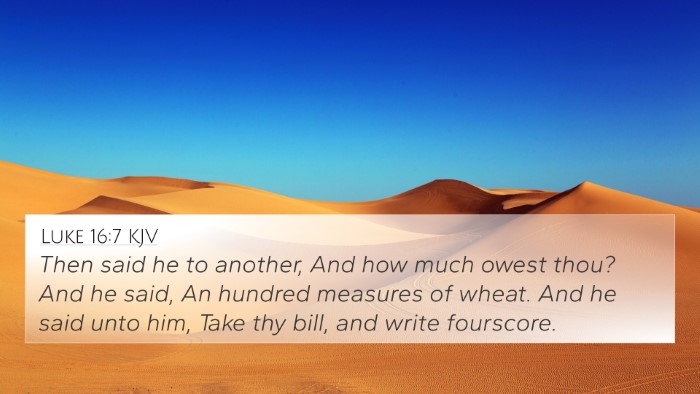Understanding Matthew 18:24
Matthew 18:24 states: "And when he had begun to reckon, one was brought unto him, which owed him ten thousand talents." This verse deals with the themes of debt, forgiveness, and the nature of the kingdom of heaven as taught by Jesus.
Verse Context and Overview
In this parable of the unforgiving servant (Matthew 18:23-35), Jesus illustrates the immense forgiveness God offers to humanity compared to the relatively small grievances we may hold against one another. The servant in question owes a large sum, symbolizing the insurmountable debt of sin we have before God.
Summarized Insights from Commentaries
-
Matthew Henry:
Henry emphasizes the overwhelming nature of the debt represented by ten thousand talents, which was an enormous sum at that time. He notes that this illustrates the sins against God that humanity cannot repay, advocating for the mercy and grace that God offers.
-
Albert Barnes:
Barnes points out the specifics of the debt's measurement, highlighting its proportion to the average servant's wages. He argues this parable demonstrates the grace involved in divine forgiveness compared to the petty grievances we often bear.
-
Adam Clarke:
Clarke provides a cultural context for the parable, including a reflection on the Hebrew understanding of forgiveness and debt. He expounds on the idea that the exorbitant debt signifies not just monetary value but the weight of sinful actions against God.
Theme Connection and Cross-References
This verse's key themes resonate throughout the Bible, establishing a foundation for understanding concepts like forgiveness and relational responsibility. Below are notable cross-references that enhance understanding of Matthew 18:24.
Related Bible Cross-References
- Matthew 6:12 - "And forgive us our debts, as we forgive our debtors." This verse reflects the prayerful acknowledgment of mutual forgiveness.
- Luke 7:41-43 - The story of two debtors emphasizes the principle that those forgiven much, love much.
- Ephesians 4:32 - "And be ye kind one to another, tenderhearted, forgiving one another, even as God for Christ's sake hath forgiven you." This verse ties back to the premise of mercy.
- Colossians 3:13 - "Forbearing one another, and forgiving one another, if any man have a quarrel against any: even as Christ forgave you, so also do ye." This reinforces the call to forgive.
- Romans 5:8 - "But God commendeth his love toward us, in that, while we were yet sinners, Christ died for us." This illustrates the unconditional aspect of divine forgiveness.
- Isaiah 1:18 - "Come now, and let us reason together, saith the LORD: though your sins be as scarlet, they shall be as white as snow." A beautiful picture of God's willingness to forgive.
- 1 John 1:9 - "If we confess our sins, he is faithful and just to forgive us our sins, and to cleanse us from all unrighteousness." Highlighting the assurance of God's forgiveness.
Understanding the Implications of Forgiveness
The message of Matthew 18:24 extends beyond the individual and calls upon the community to understand the weight of forgiveness. Acknowledging one’s own debt to God should naturally lead to extending forgiveness to others, thereby fostering a community of grace.
Thematic Bible Verse Connections
This passage prompts a thematic analysis throughout Scripture concerning mercy, grace, and the relational dynamics between God and humanity as well as between individuals. Such connections highlight the importance of reconciliation in the fabric of biblical teaching.
Tools for Bible Cross-Referencing
To deepen understanding of verses like Matthew 18:24, the following resources can be utilized:
- Bible concordance - for finding specific themes and connections.
- Bible cross-reference guide - assists in locating related passages.
- Cross-reference Bible study - structured resources to study the interconnections of scripture.
- How to use Bible cross-references - guides on navigating biblical texts effectively.
- Bible reference resources - comprehensive materials that compile supporting verses.
Conclusion
Matthew 18:24 encapsulates the profound and transformative message of the Gospel concerning sin, debt, and forgiveness. By examining the breadth of related scriptures, themes, and communal responsibilities, one can grasp the weight of Jesus' teachings and their implications in the life of believers.











